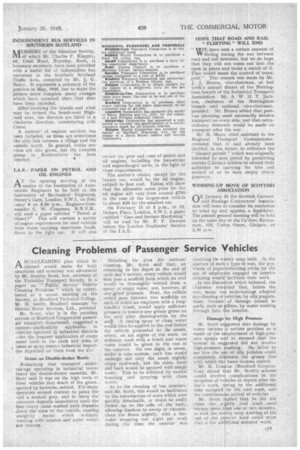INDEPENDENT BUS SERVICES IN SOUTHERN SCOTLAND
Page 21

If you've noticed an error in this article please click here to report it so we can fix it.
MEMBERS of the Omnibus Society, of which Mr. Charles F. Klappeo, 45, Crest Road, Bromley, Kent, is honorary secretary, have been provided with a useful list of independent bus operators in the Southern Scotland Traffic Area, compiled by Mr. I. G. Baker. It represents a summary of the position in May, 1939, but to make the picture more complete many changes which have occurred since that time have been recorded.
After covering the islands and what may be termed the South-west Highland zone, the districts are listed in a clockwise direction, commencing with Cowal.
A number of express services has been included, as these are sometimes the only link between a village and the outside world, In general, works services are also given, but the complex group in .Renfrewshire has been omitted, •
I.A.E.. PAPER ON PETROL AND OIL ENGINES A T the opening meeting of the
session of the Institution of Automobile Engineers to be held at the Institution of Mechanical Engineers, Storey's Gate, London, S.W.1, on Feb:. ruary 6 at 5.30 p.m., Engineer-Commander C. W. Chapman, R.N.V.R., will read a paper entitled " Petrol or Diesel ?" This will contain a survey of engine requirements for road vehicles from those carrying maximum loads, down to the light car. It will also review the pros and cons of petrol and oil engines, including the two-stroke and supercharged units, in the light of these requirements.
The author's choice, except for the luxury car, would be the oil engine, subject to first cost. Tables will show that the allowable extra price for the nil engine will vary from around £700 in the case of the largest-size vehicle to about £20 for the smallest car. • •
On February 11 at 3 p.m., at 12, liobart Place, London, S.W.1, a paper entitled "Case and Surface Hardening" will be read by Mr. P. F. Dawson before the London Graduates' Section of the I.A.E.
HOPE THAT ROAD AND RAIL " FLIRTING " WILL END
" WE have seen a certain amount of flirting during the war between road and rail interests, but we do hope that they will not come out into the open in peace and make a match of it. That would mean the control of transport." This remark was made by Mr. J. J. Brown, vice-chairman, at last neek's annual dinner of the Nottingham branch of the Industrial Transport Association. Mr, A. W. H. T. Jackson, chairman of the Nottingham branch and national vice-chairman, presided. Mr. Brown added that postwar Planning must necessarily involve transport on every side, and that extraordinary demands would be made on transport after the war.
Mr. H. Mayo, chief assistant to the Regional . Transport Commissioner, revealed that it had already been decided, in the future, to withdraw the "blanket permit " which WaS originally intended to save petrol by permitting certain C-licence holders to extend their activities to carrying for hire and reward so as to save empty return journeys.
WINDING UP MOVE OF SCOTTISH ASSOCIATION
ONJanuary' 31 the Scottish Carriers' and Haulage Contractors' Association will meet to consider its resolution to wind up and appoint a liquidator. The annual general meeting will be held on the same day at the Ca'doro Restaurant, 122, Union Street, Glasgow, at 2.30 p.m.




















































